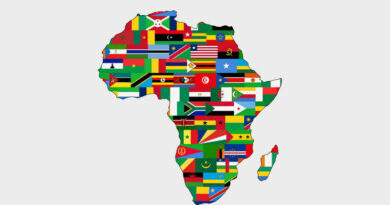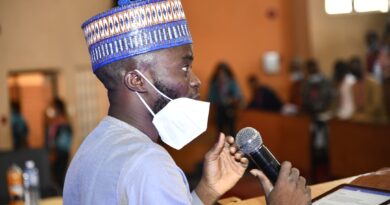An Elegy for Sheikh Adam Al-Ilory, By Oladeinde Olawoyin
An Elegy for Sheikh Adam Al-Ilory, By Oladeinde Olawoyin
First, there was Babatunde Jose, the legendary doyen of Nigerian journalism and easily one of the most consequential figures in Nigerian media history. Then there is Professor Ishaq Oloyede, the JAMB Registrar. Between both men, there is a legion of outstanding humans who graduated from Markaz Arabic and Islamic School in Agege area of Lagos and have continued to impact the world in no small way. In effect, in terms of dexterity of influence and longevity of human impact, apart from the highly revered Sheikh Kamaldeen Al-Adaby, very few Islamic scholars of Yoruba descent could have their names placed in the same sentence as Sheikh Adam Abdullahi Al-Ilory. And, arguably too, Markaz must have produced the highest number of (Yoruba) Muslim professionals across disciplines in the past century.
Despite his importance and the immeasurable impact of his fountain of knowledge, I have always bellyached to no end over the seemingly little recognition the late scholar and teacher enjoys in conversations outside of his immediate sphere of influence (i.e Muslim community of scholars) in Nigeria.
READ ALSO: UNILORIN VCship Tussle: Be Fair, Transparent, Emirates Alumni Task Council
And so, the other day, it was quite heartwarming listening to ‘Ireti Mi’, a brilliant eulogy by Alhaji Abdulsalam Abiodun (Saoty Arewa), a perceptive songwriter and poet, in honour of Sheikh Adam. The recognition resonates not just because Saoty is by critical and popular acclaim one of the most important Yoruba Islamic songwriters of his generation, nor because Sheikh Adam was and still is deserving of the beautiful lines of eulogy. It’s important essentially because it has the potential to open a bigger conversation about Shiekh Adam’s legacy in interfaith dialogues and peaceful co-existence in a multifaith society like ours.
Sheikh Adam’s importance and influence, visible in the numerous Markaz-esque Islamic institutions scattered all over Nigeria and across the borders of Benin Republic and beyond, remain significant even in the lives of Muslims who didn’t directly go through Markaz in Agege. Until his death on 3rd May 1992, the revered Sheik was quite phenomenal in his spread of knowledge. So huge was Sheikh Adam’s impact that, on the average, seven out of ten students of knowledge who had their Ibtidahi and Thanawwy Classes anywhere in Lagos and across Yorubaland in the last five decades must have drunk from his river of knowledge. Why? Either their direct teacher or their teacher’s own teacher, must have had something to do with Markaz and its long, long list of alumni. My direct Ustaz (Arabic teacher), for instance, was a product of the ‘Daaru’ School, yet, in some way, almost all of the Daaru-esque schools came as an offshoot of Markaz.
To be sure, between when I had my Arabic classes and now, I have had a shift in my conception of a number of things about Islam and nature, including Sheikh Adam’s own early-year philosophical thoughts on life and its complexities. For instance, I have reservations for some of the thoughts in his popular texts, and those he reportedly edited in the early years, notably Fawakihu and Qola Sheu. But despite this concern, I have the most respect for Sheikh Adam, his progressive thoughts on interfaith coexistence, and the impact he has on generations of Muslims in western Nigeria and beyond our borders — warts and all.
Saoty Arewa’s eulogy in Ireti Mi is rich in history as it is in wordplay, giving every proud Markaz product (and by-products) a sense of pride. The long list of outstanding alumni of Markaz had impressive names like the respected Sheikh Sulaiman Raji, Professor Fatiu Akesode of LASU, Sheikh Garba Akinola, Shaykh Mustapha Zuglool, Sheikh Farouq Onikijipa, Sheikh Shazili Zambo, among others.
(On a lighter note, I reckon that the inclusion of Yesaloonaka and Jaqmal in the roll call, for any perceptive observer, is in some way a marketing strategy. And I say this without prejudice to whatever the duo represents today — warts, loquacity and all. The inclusion also speaks to the centrality of these emerging voices as influencers within the bigger social media ecosystem, providing loquacious elements like Yahaya Gambari a bragging right and the much-needed weapon to taunt supposed “enemies” like Saheed Shittu, Oniyawometa et al, in the never-ending struggle for supremacy of ideas on the cyberspace).
In this age of mutual tension and religious intolerance, for me the most important legacy of Sheikh Adam would be his understanding of, and teachings around, the complexity of a society like ours, with focus on how Muslims can live peacefully with non-Muslims. He wasn’t perfect, but his imprint remains unmatched. And more than anything today, we need his messages of INCLUSION and peaceful coexistence in a society being torn apart, albeit slowly, by, among others, infertile radicalism.
To be sure, but for the needless fight for supremacy among young Yoruba Muslim ideologues, the idea of institutional dichotomy among products of Madaaris (modern Arabic schools), as well as the ideological warfare in today’s (Yoruba) Muslim world, should ordinarily be a non-issue. And so my resolve to celebrate Sheikh Adam isn’t in any way a denigration of other notable scholars of note in the region. No, both ideas aren’t mutually exclusive.
More importantly, there are far more serious issues begging for attention among the Muslim community in Yorubaland, which remain largely unaddressed. That’s perhaps one reason why young people like me who had a hybrid learning experience through the teachings of Sheikh Adam, the philosophy of Sheik Kamaldeen Al-Adaby, and even the early years of tutorials in Makondoro schools, could see through this needless fog of division and open our minds to developmental suggestions across ideological divides.
Beyond the needless din being elevated as “ideological warfare” among Yoruba Muslims on the cyberspace, for instance one of the most existential concerns today would be the sheer criminality being promoted by disillusioned Muslim clerics under the guise of Jalabi.
Jalabi, according to scholars, is originally an Arabic word with roots in the triconsonantal foundation of j-l-b, which has variegated meanings and connotations. Classic Arabic lexicographers opine that al-jalb is synonymous with al-Jazb, meaning to draw, attract, or drag something from one place to another — especially if put in the context of grammatical inflexion, as in ‘Jalaba’, ‘Jalabahu’, ‘Yajlibuhu’, ‘Jalaban’ etc. Some other scholars argue that some other terminologies — such as al-kasb — could reflect the ultimate aim, which is to repel evil and bring about fortune.
Historically, in Yorubaland, the Jalabi practice is rooted in socio-religious services rendered by Ulamas (Muslim scholars) to clients, which include spiritual consultation, healing, ’special Dua’ (prayers), divination through sand-cutting, rosary selection, charm-making, among others. Without prejudice to whatever positive effect this practice might have had in the development of the Ummah in the years prior, today’s unbridled Jalabi practice has become a cancer eating deep into the body of the Muslim Ummah. It manifests now in sheer criminal activities such as ‘ritual killings’, kidnapping, blackmail, extortion, molestation, and all sorts of sex-related crimes. It’s not unusual today to read of such criminal activities in the newspaper, almost daily, with pictures of so-called Muslim clerics always in display. Any discussion around (latter-day) Jalabi practice is quite contentious, to be sure. But frankly, wherever one stands on the ideological spectrum, what’s not in doubt anymore is that Jalabi would destroy the soul of a whole generation of Yoruba Muslims if urgent steps are not taken to address this challenge.
Someday, I hope to return to the subject of Jalabi phenomenon, and properly situate the urgent need to disabuse the minds of young Muslims (especially of Yoruba descent) of the menace by amplifying the underlying dangers. I’d also dwell on the need to empower students in Modaaris (Islamic schools) today with needed entrepreneurial skills to be economically productive, rather than graduate into lying leeches fleecing unsuspecting people of their hard-earned money in the name of some phantom Jalabi practice.
But in the meantime, with regard to the need for young Muslims to be economically independent and train as professionals in different fields of human endeavors, we can take quick lessons from the teachings of Sheikh Kamaldeen Al-Adaby and Sheikh Adam Al-Ilory. Apart from his loud campaigns against the growing fad of Jalabi and the evils committed in its name by mischievous clerics, Sheikh Kamaldeen was particular about the need for young Muslims to acquire western education and empower themselves with the requisite knowledge to represent Islam proudly across fields. Of course, from the list of alumni produced by Morkaz, which include top industrialists, successful businessmen, outstanding media professionals, respected educationists, among others, Sheikh Adam equally spoke loudly on the need to train people and make them productive in different fields of human endeavours, beyond Arabic and Islamic knowledge.
Today, I salute Sheikh Abdullah Adam Al-Ilory and pray that Allah bless him and overlook his shortcomings. I also celebrate and recognise his products, both by biology and ideology — most notably Sheikh Habeebulahi Al-Ilory — and the impact they continue to make in society, warts and all.
In the same vein, I celebrate Sheikh Kamaldeen Al-adaby and all other scholars who lived before, during and after Sheikh Adam’s reign and contributed in no small measure to the spread of knowledge before they all departed.
May they all find eternal rest. A’amen.
Oladeinde Olawoyin tweets via @Ola_deinde.




